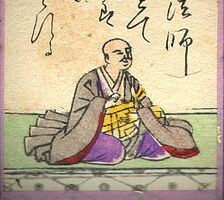Saigyō
| English Phonetics | Saigyō |
|---|---|
| Sort Name | Saigyō |
| Japanese Script | 西行 |
| Birth: | 1118 |
|---|---|
| Death: | 1190 |
Tibetan calendar dates
Biographical Information
A Japanese Buddhist poet of the late Heian and early Kamakura periods, especially famous for his many waka poems, a traditional style of Japanese poetry; his dharma name literally means "Traveling West," presumably referring to the direction of the pure la n d of Amitābha. Born as Satō Norikiyo into a family of the warrior class, he served during his youth as a guard for the retired emperor Toba (r. 1107-1123) before becoming a monk at the age of twenty-two. Although relatively little is known about his life, Saigyō seems to have traveled around the country on pilgrimage before eventually settling in relative seclusion on Kōyasan, the headquarters of the Shingonshū. Virtually all of his poems are written in the thirty-one-syllable waka form favored at court and cover most of the traditional topics addressed in such poems, including travel, reclusion, cherry blossoms, and the beauty of the moon in the night sky. His poetry also reflects the desolation and despondency that Japanese of his time may have felt was inevitable during the degenerate age of the dharma (J. mappō; C. mofa). Saigyō's Sankashū ("Mountain Home Collection") includes some fifteen hundred poems written in the course of his career; ninety-four of these poems were included in the imperially sponsored waka collection, the Shinkokinshū ("New Collection of Ancient and Modern Times"), compiled in 1205, making him one of Japan’s most renowned and influential poets. (Source: "Saigyō." In The Princeton Dictionary of Buddhism, 738. Princeton University Press, 2014. http://www.jstor.org/stable/j.ctt46n41q.27.)
- Wiki Pages
- Person description or short bio
Expand to see this person's philosophical positions on Buddha-nature.
| Is Buddha-nature considered definitive or provisional? | |
|---|---|
| Position: | |
| Notes: | |
| All beings have Buddha-nature | |
| Position: | |
| If "Qualified", explain: | |
| Notes: | |
| Which Wheel Turning | |
| Position: | |
| Notes: | |
| Yogācāra vs Madhyamaka | |
| Position: | |
| Notes: | |
| Zhentong vs Rangtong | |
| Position: | |
| Notes: | |
| Promotes how many vehicles? | |
| Position: | |
| Notes: | |
| Analytic vs Meditative Tradition | |
| Position: | |
| Notes: | |
| What is Buddha-nature? | |
| Position: | |
| Notes: | |
| Svātantrika (རང་རྒྱུད་) vs Prāsaṅgika (ཐལ་འགྱུར་པ་) | |
| Position: | |
| Notes: | |
| Causal nature of the vajrapāda | |
| Position: | |
